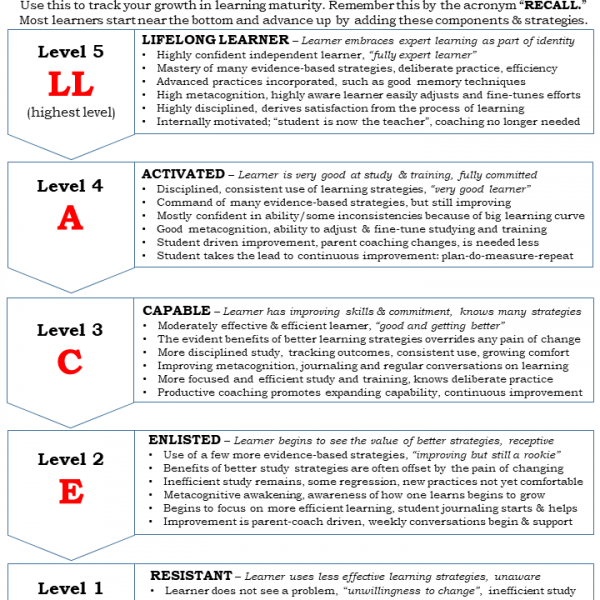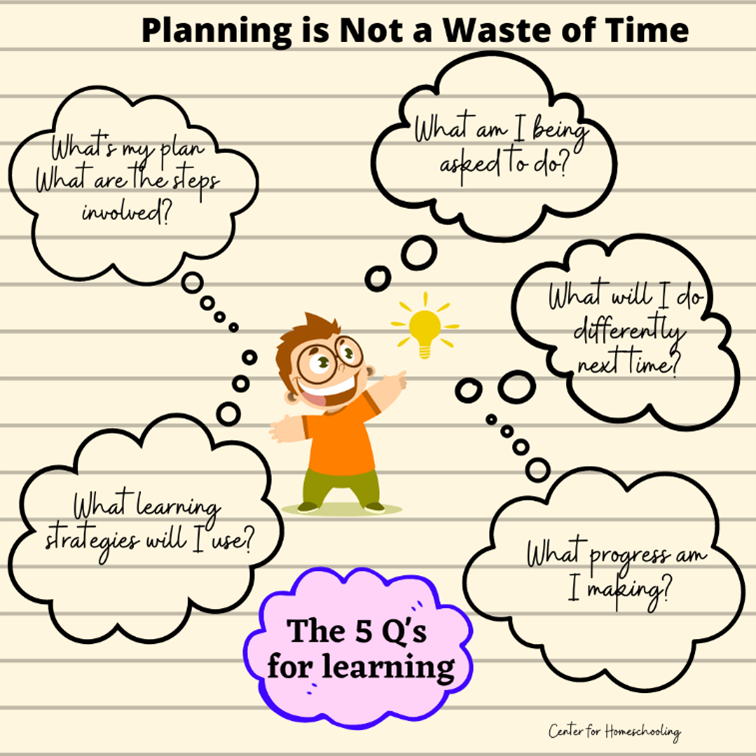
One Big Thing to Improve Your Studies

Reading time: 10 minutes
Many students, along with their parents, don’t appreciate the connection of good study planning to better learning. Better planning has the obvious benefit of helping you manage your brain’s energy and your time, but it also helps you study smarter. Another unrecognized benefit is it encourages you to think about your learning which, in turn, helps you improve and fine-tune the effectiveness of those efforts.
Better students know how to use planning to boost their learning. The problem is this – most students don’t know how to do it well. And some don’t do it at all.
Use this short mini-lesson to have a conversation with your kids on how to do a better job planning their studies so they can boost their ability to learn faster and better.
In the family of intellectual activities, the process of learning shares many attributes with that of the world of work. Many of the practices used to help people work smarter and more efficiently also apply to learning and studying. Kids benefit from a better understanding of the power of good planning.
We know work gets done faster, and with fewer errors, when there is a good plan in place. The proven principle is we get more done, in less time, when we carefully plan our work, our project, or when we build something. The central idea is to carefully lay out, in advance and from prior experience and knowledge gained, the best way to get from point A to B. It doesn’t work well to start your studies, then push yourself to quickly decide on some kind of plan.
The preparation you do beforehand helps you study smarter. But you have to convince your kids that the time they spend doing this is worthwhile.
“The key is not the will to win…everybody has that. It is the will to prepare to win that is important.” – Bobby Knight
But why do so many students fail to plan and lack the will to do it?
To be honest, most of us as adults aren’t all that effective at planning so we don’t set a good example. This doesn’t make us bad; we simply haven’t been trained to do it properly, and the principles we know have been roughly acquired through trial and error, then passed on to our kids. And for those who have taken a course on planning, we often ignore that knowledge because we prefer to just dig in and get going.
The stereotypical plan written on the back of an envelope personifies the problem. We honor the genius who quickly jots ideas down apparently without thought.
Further, our culture has a bias toward action. Perhaps best personified by the Nike ad campaign of “Just Do It” suggesting those who prefer to plan are timid or somehow avoiding getting going. Do many hold the subconscious belief – planning is for sissies and people who aren’t willing to do it? It seems so. Nike sold a boatload of shoes.
But this thinking backfires for kids when learning. Learning requires not some immediate action, but deeper thinking and self-awareness, and the discipline to apply both. Just do it is the wrong approach.
For example, imagine you set out to learn Spanish as a second language on your own. To learn, you must think through questions like – how will I train myself to read, speak, and listen to the language? What are my strategies and resources – how will I use the tools I have to learn this stuff? And you would be wise to also consider your strengths and weaknesses based on past learning experiences and situations.
All this needs to become a habit every time your kids plan their daily or weekly studies. Without it, they may be busy studying, but learning at an excruciatingly slow pace.
One of our country’s most effective leaders and doers explains this better:
“Give me six hours to chop down a tree and I will spend the first four sharpening the ax.” – Abe Lincoln
Lincoln recognized the relationship of preparation to getting results. He did not see planning as a burdensome additional step. He recognized if you fail to plan, you’ll also fail to execute. A good plan enables you to get to your destination faster.
And Ben Franklin did it too, he used plans and had 13 virtues he practiced every week. He emphasized the value of intentional planning, honest self-monitoring, and devotion of time without distraction.
So, lets’ visit how your study planning can be easily improved. Here is one thing you can emphasize to replace just do it thinking so your kids can learn faster and better.
First, try answering this question:
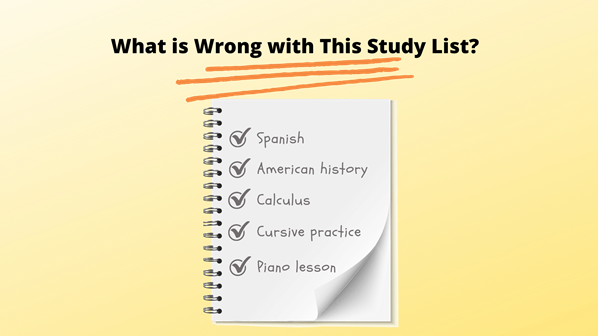
Can you identify the problem?
This looks like a fairly typical daily study list a student might jot down before “hitting the books”. Does this look familiar? Do your study plans look like this?
We can imagine the student who wrote this felt she had a good plan. It’s essentially a checklist, and after all, these can be useful. I personally like to use them for many things because it feels good when I can check off an item when I complete it. But is a checklist the best way to prepare for studying?
In the above example, the student wants to learn Spanish. Maybe she knows a history test is coming soon. And that Calculus – well, she knows you won’t learn something hard it if you don’t practice it.
But the question remains–is this a good study plan? It’s nice this student has made a list, and (good for her0 she checked off the items as she completed them. But …
Discussion Question
- There is something fundamentally wrong with this list as a plan. What’s missing? Can you identify it?
Here is the one very big thing that is missing in that plan.

If your plan doesn’t describe the actions you will take, you only have a checklist – it’s not a plan. There is a big difference. To study efficiently, you must think and define what you will do to learn the subject matter. Your study plans should consider the outcomes you seek and describe how you intend to get there.
You write a study plan to ensure you are making your best efforts. You apply your experience from prior study sessions to improve your efforts.
The students who use the checklist approach may find themselves aimlessly deciding to pick up a deck of Spanish flashcards, go through them multiple times, and then mark this off as a learning experience, even if little progress was made. Without a good study plan with actions, you might end up sitting at the piano playing that one song for what seems forever – and not learning much. When you haven’t identified your actions in a plan, you can waste valuable study time and brain energy thinking about what to do next. This is the wrong time to do that.
Sadly, many students don’t realize poorly written study plans are holding them back. Checklists can create the illusion you are making good progress because you only have to acknowledge you did something. But that something can be vague.
When you really want to learn something, you need a plan that connects your actions to the result you want. This is called thinking about your learning outcomes.
Every study session should be purposeful. You do this by listing those actions you will take including the strategies, tools, and methods you intend to use.
Remember, topics on a sheet of paper are not a plan. If you don’t have a plan, you will waste study time and energy deciding what to do. And those decisions may be rushed and not well thought out. Study time is a valuable resource – use it wisely.
The two column method is a better way to plan how you will study.
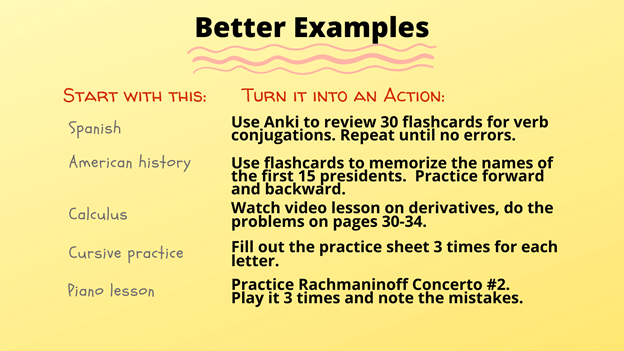
Notice above how the student translated each study topic on the left into an action for this week, or today’s session, on the right.
The words on the right begin to make this a real plan because they now state an action to be taken to achieve a result. And this is better not only because it is more specific, but because it is a product of the student thinking about how he will learn.
The action statements become your plan to get better. Our example student realized she needed to work on her verbs to get better at Spanish. This student knows enough about her own learning that she know she will need to practice cursive three times to improve.
The piano lesson is not just any music piece, but one she chose to work on to improve a specific set of skills.
As you can see, good study planning is easy to do. You just have to take a little time to think it through. Use the two-column approach to list your strategies and actions.
The key to better more effective learning is doing better study planning.
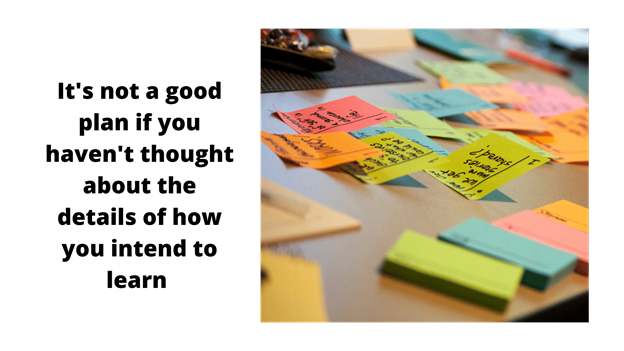
Let’s review the steps. You take the subject matter you want to learn this week or tomorrow, and first, think about the best most efficient way to study to reach your goal (this is your why).
Then you think about the methods and strategies you will need to use to learn (this is your how) and you write these down in your plan.
THINK then WRITE ACTIONS – these are your two simple steps. And do this before you study so you are not using study time to plan. The day before is even better.
Devote a little time to your planning to break it down into greater detail describing what you will do. Consider what you need to work on, the steps, and how you learn best. A good learning plan considers your gaps in knowledge and your ideas on how you will fill these gaps.
Discussion Questions
- Have you been writing a study plan for every day? Why or why not?
- If you have been writing study plans, do you list actions of how you intend to study?
- What could you do differently to improve your study planning?
If you now have some ideas on how to plan better, now you need to describe your next steps to start doing it better.
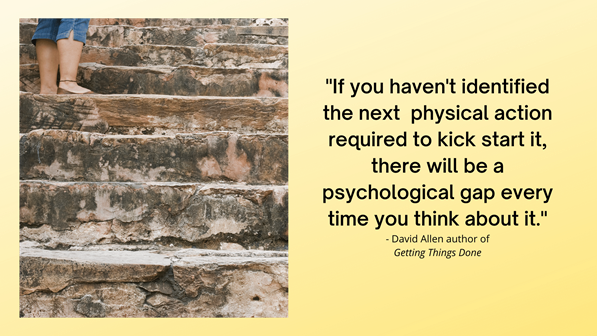
The author David Allen in his book shares with us the importance of defining your next step. If you want to become a faster learner where will start?
Most good ideas fall by the wayside because they weren’t implemented right away. You need to decide what you will do next. Don’t wait for tomorrow because you risk losing your momentum.
What will you do differently? When will you start?
While it might take you a little while to put together a better set of new habits around study planning, you need to think about your next action and do it today.
It sounds a little funny, but you need a plan to do a better job of planning!
Discussion Questions
- What study plan can you write today for tomorrow? List the subjects and the actions you will take. Take an extra minute to do this.
- What methods and study strategies can you think of to make this a good plan? Your strategies are your tools – think of them as your resources.
- What plan can you write for next week’s studies? When will you write this? Weekly plans give you goals to shoot for. They can motivate you.
Decide and do it! You will surprise yourself with how easy this is to do.
Lets’ go over the major points again.
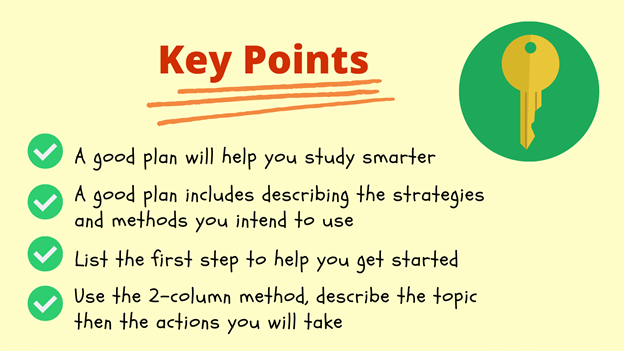
For more on better study planning, see our Free Resources section on our website.












